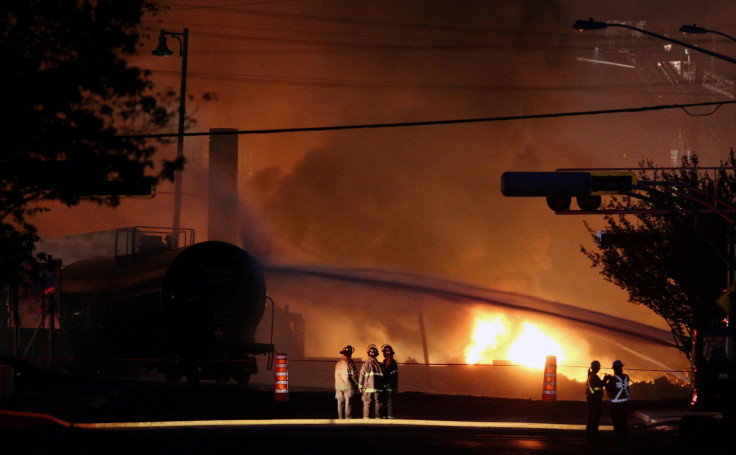After Deadly Derailments, Regulators Pressure Companies To Test Bakken Oil

After a series of derailments of oil-transport trains in 2013 that caused extensive damage, evacuations and dozens of deaths, the U.S. Department of Transportation warned the industry that it needed to start testing crude extracted from the Bakken Shale to see if it's more volatile than ordinary oil and could be the reason accidents have gotten so dangerous. That was in early January. And the DOT is still waiting.
“The overall and ongoing lack of cooperation is disappointing, slows progress and certainly raises concerns,” the agency told Reuters.
“Despite the energy industry making assurances to DOT more than two months ago, we still lack data we requested and that energy stakeholders agreed to produce,” it said.
The worst recent incident happened in July in Lac-Megantic, Quebec, when a runaway train caught fire and killed 47 people. Similar recent accidents in Alberta, Alaska and New Brunswick weren't as deadly but have certainly raised concerns.
On Dec. 30, several oil tankers ruptured and caught fire outside Casselton, N.D., and caused massive evacuations. Three days later, the federal Pipeline and Hazardous Materials Safety Administration issued an alert that “derailments and resulting fires indicate that the type of crude oil being transported from the Bakken region may be more flammable than traditional heavy crude oil.”
“It is imperative that offerors properly classify and describe hazardous materials being offered for transportation,” the notice reads.
The Bakken region is one of the top oil-producing regions in North America, and covers a large swath of North Dakota and Montana.
Some of the country’s largest oil companies have high stakes in the region, which is still relatively new to development.
ConocoPhillops, the largest independent exploration and production company in the U.S., saw oil production rise 24 percent last year, as Bakken field production rose 60 percent and hit 30,000 barrels per day, according to a MarketWatch report.
As Bakken production increases, so has business for the crude-by-rail industry. But many of the cars are made according to older safety standards and have yet to be retrofitted to new specifications.
“One of the biggest problems is that many of the cars used to transport the oil… are not designed to carry flammable Bakken crude oil,” said Jim Fugile, former Democratic party activist and state tourism director, to Minnesota news site MinnPost.
Fugile has been a vocal opponent of the Bakken boom, arguing that development is moving too fast at the price of safety and economic fairness.
Last week Harold Hamm, the CEO of Continental Resources Inc., one of the major players in North Dakota drilling, assured reporters that the crude doesn’t have any problems.
“Bakken oil is safe,” he said to reporters, according to a Reuters report.
“Anytime you don’t keep trains on the track, bad things happen,” he added.
© Copyright IBTimes 2024. All rights reserved.












